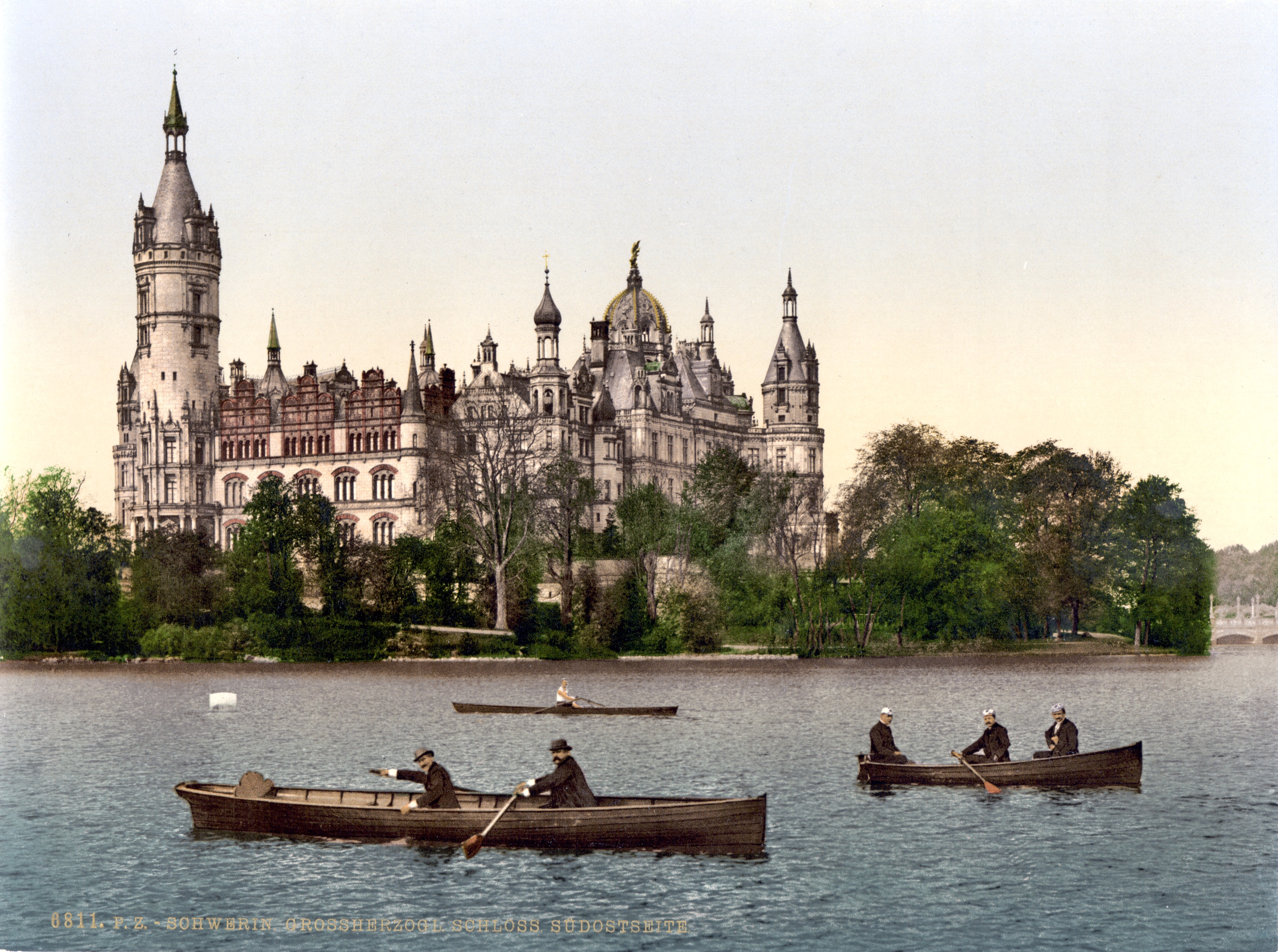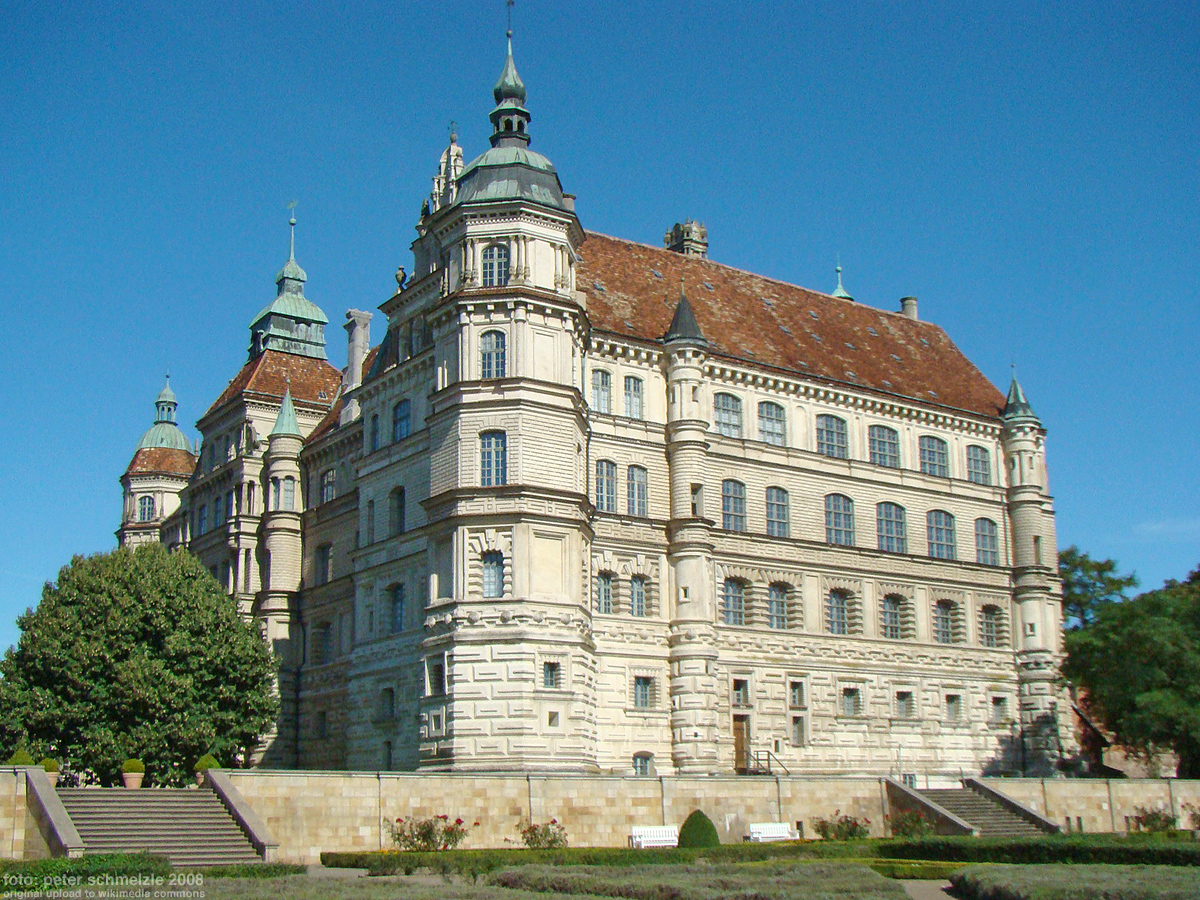|
Mecklenburg Schwerin
The Grand Duchy of Mecklenburg-Schwerin was a territory in Northern Germany held by the House of Mecklenburg residing at Schwerin. It was a sovereign member state of the German Confederation and became a federated state of the North German Confederation and finally of the German Empire in 1871. Geography Like its predecessor, the Duchy of Mecklenburg-Schwerin, the Schwerin lands upon the incorporation of the extinct Duchy of Mecklenburg-Güstrow in 1701 comprised the larger central and western parts of the historic Mecklenburg region. The smaller southeastern part was held by the Duchy of Mecklenburg-Strelitz branch of the grand ducal house, who also ruled over the lands of the former Bishopric of Ratzeburg in the far northwest. The grand duchy was bounded by the Baltic coast in the north and the Prussian province of Pomerania in the northeast, where the border with the Hither Pomeranian (formerly Swedish Pomeranian) region ran along the Recknitz river, the Peene, and Kummer ... [...More Info...] [...Related Items...] OR: [Wikipedia] [Google] [Baidu] |
States Of The German Confederation
The states of the German Confederation were member states of the German Confederation, from 20 June 1815 until 24 August 1866. On the whole, its territory nearly coincided with that remaining in the Holy Roman Empire at the outbreak of the French Revolution, with the notable exception of Belgium. Except for the two rival major powers, Austrian Empire, Austria and Kingdom of Prussia, Prussia, and the western left bank of the Rhine (which France had annexed, with tiny County of Katzenelnbogen, Katzenelnbogen), the other member states (or their precursors) had been within Napoleon, Napoleon's Confederation of the Rhine. #The Austrian Empire, excluding the Kingdom of Hungary, the Principality of Transylvania (1711–1867), Principality of Transylvania, and the Kingdom of Croatia (Habsburg), Kingdom of Croatia (all of which became parts of the Apostolic King, apostolic kingdom of Hungary within the Danubian Austria-Hungary, Dual Monarchy), the Kingdom of Lombardy–Venetia (constituti ... [...More Info...] [...Related Items...] OR: [Wikipedia] [Google] [Baidu] |
Frederick Francis II, Grand Duke Of Mecklenburg-Schwerin
Frederick Francis II (German: ''Friedrich Franz II;'' 28 February 1823 – 15 April 1883) was a Prussian officer and Grand Duke of Mecklenburg-Schwerin from 7 March 1842 until 15 April 1883. Biography He was born in Schloss Ludwigslust, the eldest son of Hereditary Grand Duke Paul Friedrich of Mecklenburg-Schwerin and his wife Princess Alexandrine of Prussia. He became heir apparent to the grand duchy following the death of his great-grandfather Frederick Francis I on 1 February 1837. Frederick Francis was privately educated until 1838. He then attended the Blochmann institute in Dresden before going to the University of Bonn. Frederick Francis succeeded his father as Grand Duke on 7 March 1842. During the Second Schleswig War Frederick Francis served on the staff of Generalfeldmarschall Friedrich Graf von Wrangel, having refused a command in the fight against Denmark since Christian IX of Denmark was a close friend. During the Austro-Prussian War he commanded the forces tha ... [...More Info...] [...Related Items...] OR: [Wikipedia] [Google] [Baidu] |
Duchy Of Mecklenburg-Strelitz
The Duchy of Mecklenburg-Strelitz was a duchy in northern Germany consisting of the eastern fifth of the historic Mecklenburg region, roughly corresponding with the present-day Mecklenburg-Strelitz district (the former Lordship of Stargard), and the western exclave of the former Bishopric of Ratzeburg in modern Schleswig-Holstein. At the time of its establishment, the duchy bordered on the territory of Swedish Pomerania in the north and of Brandenburg in the south. History After more than five years of dispute over succession to the House of Mecklenburg, the duchy was established in 1701 in the territory of the former duchy of Mecklenburg-Güstrow. The Güstrow branch of the House of Mecklenburg had died out with the death of Duke Gustav Adolph in 1695. Duke Frederick William of Mecklenburg-Schwerin claimed heirship, but he had to deal with the demands of his uncle Adolphus Frederick, husband of Mary of Mecklenburg-Güstrow, the daughter of Gustav Adolph. The emissaries of ... [...More Info...] [...Related Items...] OR: [Wikipedia] [Google] [Baidu] |
Mecklenburg
Mecklenburg (; nds, label=Low German, Mękel(n)borg ) is a historical region in northern Germany comprising the western and larger part of the federal-state Mecklenburg-Western Pomerania. The largest cities of the region are Rostock, Schwerin, Neubrandenburg, Wismar and Güstrow. The name Mecklenburg derives from a castle named '' Mikilenburg'' (Old Saxon for "big castle", hence its translation into New Latin and Greek as ), located between the cities of Schwerin and Wismar. In Slavic languages it was known as ''Veligrad'', which also means "big castle". It was the ancestral seat of the House of Mecklenburg; for a time the area was divided into Mecklenburg-Schwerin and Mecklenburg-Strelitz among the same dynasty. Linguistically Mecklenburgers retain and use many features of Low German vocabulary or phonology. The adjective for the region is ''Mecklenburgian'' or ''Mecklenburgish'' (german: mecklenburgisch, link=no); inhabitants are called Mecklenburgians or Mecklenburgers ( ... [...More Info...] [...Related Items...] OR: [Wikipedia] [Google] [Baidu] |
Mecklenburg-Güstrow
Mecklenburg-Güstrow was a state of the Holy Roman Empire in Northern Germany, that existed on three occasions ruled by the House of Mecklenburg at Güstrow. History A first short-lived predecessor existed after the death of Henry IV, Duke of Mecklenburg in 1477 and the subsequent partition of his lands among his sons in 1480. Albert VI received the estates of the former Lordship of Werle around Güstrow. However, Albert died without issue in 1483 and his lands were inherited by his younger brother Magnus II, Duke of Mecklenburg-Schwerin. When Magnus died in 1503, his sons Henry V and Albert VII at first ruled jointly over the entire Mecklenburg duchy until its renewed division by the 1520 Neubrandenburg Treaty. Albert, a fierce opponent of the Protestant Reformation, had insisted on the partition and became duke of Mecklenburg-Güstrow, while his brother Henry retained Mecklenburg-Schwerin. However Mecklenburg ''de jure'' remained undivided; both brothers held the title of Duk ... [...More Info...] [...Related Items...] OR: [Wikipedia] [Google] [Baidu] |
Duchy Of Mecklenburg-Schwerin
The Duchy of Mecklenburg-Schwerin was a duchy in northern Germany created in 1701, when Frederick William and Adolphus Frederick II divided the Duchy of Mecklenburg between Schwerin and Strelitz. Ruled by the successors of the Nikloting House of Mecklenburg, Mecklenburg-Schwerin remained a state of the Holy Roman Empire along the Baltic Sea littoral between Holstein-Glückstadt and the Duchy of Pomerania. Origins The dynasty's progenitor, Niklot (1090–1160), was a chief of the Slavic Obotrite tribal federation, who fought against the advancing Saxons and was finally defeated in 1160 by Henry the Lion in the course of the Wendish Crusade. Niklot's son, Pribislav, submitted to Henry, and in 1167 came into his paternal inheritance as the first Prince of Mecklenburg. After various divisions of territory among Pribislav's descendants, Henry II of Mecklenburg (1266–1329) by 1312 had acquired the lordships of Stargard and Rostock, and bequeathed the reunified Mecklenburg land ... [...More Info...] [...Related Items...] OR: [Wikipedia] [Google] [Baidu] |
Federated State
A federated state (which may also be referred to as a state, a province, a region, a canton, a land, a governorate, an oblast, an emirate or a country) is a territorial and constitutional community forming part of a federation. Such states differ from fully sovereign states, in that they do not have full sovereign powers, as the sovereign powers have been divided between the federated states and the central or federal government. Importantly, federated states do not have standing as entities of international law. Instead, the federal union as a single entity is the sovereign state for purposes of international law.Crawford, J. (2006). The Creation of States in International Law. Oxford, Clarendon Press. Depending on the constitutional structure of a particular federation, a federated state can hold various degrees of legislative, judicial, and administrative jurisdiction over a defined geographic territory and is a form of regional government. In some cases, a federation is c ... [...More Info...] [...Related Items...] OR: [Wikipedia] [Google] [Baidu] |
Schwerin
Schwerin (; Mecklenburgisch dialect, Mecklenburgian Low German: ''Swerin''; Latin: ''Suerina'', ''Suerinum'') is the Capital city, capital and List of cities and towns in Germany, second-largest city of the northeastern States of Germany, German state of Mecklenburg-Vorpommern as well as of the region of Mecklenburg, after Rostock. It has around 96,000 inhabitants, and is thus the least populous of all German state capitals. Schwerin is located on the southwestern shore of Lake Schwerin (''Schweriner See''), the second-largest lake of the Mecklenburg Lake Plateau after the Müritz, and there are eleven other lakes within Schwerin's city limits. The city is surrounded by the district of Nordwestmecklenburg, Northwestern Mecklenburg to the north, and the district of Ludwigslust-Parchim to the south. Schwerin and the two surrounding districts form the eastern outskirts of the Hamburg Metropolitan Region. The name of the city is of Polabian Slavs, Slavic origin, deriving from the root ... [...More Info...] [...Related Items...] OR: [Wikipedia] [Google] [Baidu] |
House Of Mecklenburg
The House of Mecklenburg, also known as Nikloting, is a North German dynasty of Slavic origin that ruled until 1918 in the Mecklenburg region, being among the longest-ruling families of Europe. Queen Juliana of the Netherlands (1909–2004), former Queen of the Netherlands (1948–1980), was an agnatic member of this house. Origin The family was established by Pribislav, an Obotrite (Slavic) prince who converted to Christianity and accepted the suzerainty of Saxon Duke Henry the Lion (r. 1142–1180), his fallen father's enemy, and became the Lord of Mecklenburg (derived from ''Mikla Burg'', "big fortress", their main fortress). The Obotrites were subsequently Germanized. The main branch of the house was elevated in 1347 to ducal rank. Coats of arms Each field in the coat of arm symbolizes one of the seven high lordly dominions of the state of Mecklenburg: upper-left quarter: Duchy of Mecklenburg, upper-right quarter: Lordship of Rostock, middle-left quarter divided in ... [...More Info...] [...Related Items...] OR: [Wikipedia] [Google] [Baidu] |
Northern Germany
Northern Germany (german: link=no, Norddeutschland) is a linguistic, geographic, socio-cultural and historic region in the northern part of Germany which includes the coastal states of Schleswig-Holstein, Mecklenburg-Vorpommern and Lower Saxony and the three city-states Berlin, Hamburg and Bremen. It contrasts with Southern Germany, Western Germany and Eastern Germany. Language Northern Germany generally refers to the ''Sprachraum'' area north of the Uerdingen and Benrath line isoglosses, where Low German dialects are spoken. These comprise the Low Saxon dialects in the west (including the Westphalian language area up to the Rhineland), the East Low German region along the Baltic coast with Western Pomerania, the Altmark and northern Brandenburg, as well as the North Low German dialects. Although from the 19th century onwards, the use of Standard German was strongly promoted especially by the Prussian administration, Low German dialects are still present in rural areas, with an ... [...More Info...] [...Related Items...] OR: [Wikipedia] [Google] [Baidu] |
Germany
Germany,, officially the Federal Republic of Germany, is a country in Central Europe. It is the second most populous country in Europe after Russia, and the most populous member state of the European Union. Germany is situated between the Baltic and North seas to the north, and the Alps to the south; it covers an area of , with a population of almost 84 million within its 16 constituent states. Germany borders Denmark to the north, Poland and the Czech Republic to the east, Austria and Switzerland to the south, and France, Luxembourg, Belgium, and the Netherlands to the west. The nation's capital and most populous city is Berlin and its financial centre is Frankfurt; the largest urban area is the Ruhr. Various Germanic tribes have inhabited the northern parts of modern Germany since classical antiquity. A region named Germania was documented before AD 100. In 962, the Kingdom of Germany formed the bulk of the Holy Roman Empire. During the 16th ce ... [...More Info...] [...Related Items...] OR: [Wikipedia] [Google] [Baidu] |



